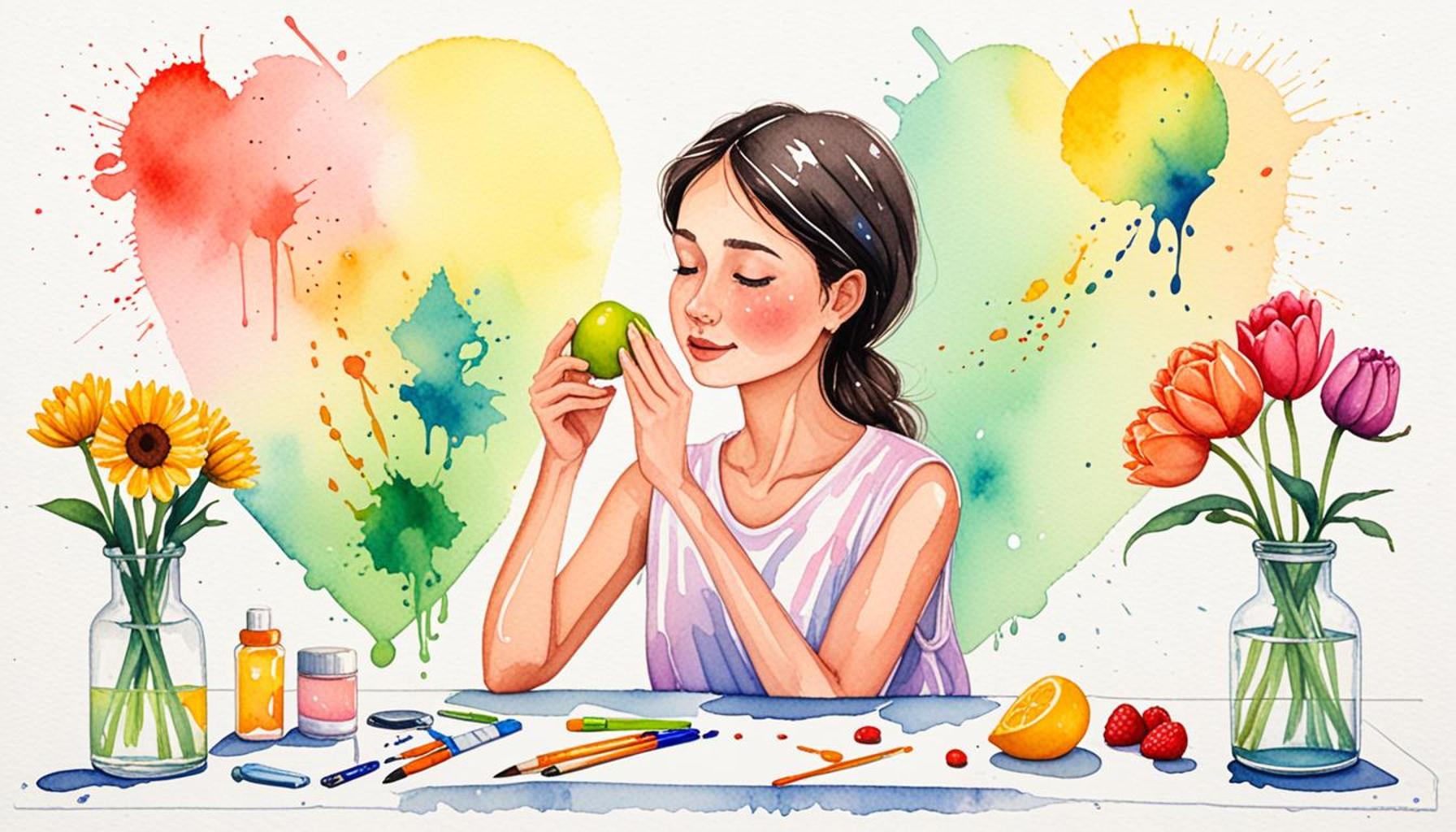Self-Reflection Practices to Cultivate Empathy and Healthy Relationships in a Growth Context

The Power of Self-Reflection
In a world that often prioritizes speed over substance, self-reflection emerges as a vital practice for personal growth and relationship enhancement. This practice enables individuals to understand their thoughts, feelings, and behaviors, leading to deeper connections with others. As we delve into the essence of empathy and the roots of healthy relationships, the significance of self-reflection becomes undeniably clear.
What Defines Self-Reflection?
Self-reflection involves taking time to introspect and evaluate one’s experiences and choices. It challenges individuals to confront their values and motives and often opens the door to personal revelations. For instance, by reflecting on past conflicts, one can discern patterns in their behavior that may contribute to misunderstandings. It can lead to remarkable insights and foster:
- Enhanced Empathy: Through self-examination, individuals can better understand others’ perspectives, fostering compassion in interactions. This understanding is particularly relevant in diverse communities within Nigeria, where various cultural backgrounds meet. Recognizing that each person’s experience shapes their perspective encourages more thoughtful engagements.
- Improved Communication: Self-reflection promotes clearer expression of thoughts and feelings. When individuals take the time to process their emotions, they can articulate their needs effectively. This becomes increasingly important in Nigeria’s fast-paced society, where misunderstandings can escalate quickly. Improving communication can bridge gaps between family members, friends, and colleagues.
- Healthy Boundaries: Recognizing personal limits in relationships is essential for maintaining emotional well-being. Self-reflection helps individuals identify when they are overextending themselves or feeling uncomfortable, thus teaching them how to say ‘no’ when necessary.
In Nigeria, where community ties are strong, embracing self-reflection practices can significantly impact interpersonal relationships. For example, community gatherings or traditional celebrations often call for individuals to reflect on their roles and contributions. By understanding oneself better, people can navigate social interactions, such as family events or local festivals, with a sense of awareness and care.
Practicing Growth Through Reflection
Incorporating self-reflection into daily life can benefit not only personal growth but also the dynamics within families and communities. Engaging in regular reflection can pave the way for:
- Conflict Resolution: Addressing misunderstandings directly and with compassion. By reflecting on one’s feelings, individuals are more equipped to handle disputes, promoting a culture of forgiveness and peace—values that resonate with many Nigerians.
- Emotional Intelligence: Self-reflection enhances the ability to connect with others on a deeper emotional level. This quality is essential not just in romantic relationships but also in friendships and professional interactions, fostering a supportive environment.
- Supportive Networks: Cultivating relationships based on trust and understanding is vital in both personal and communal settings. When individuals exhibit self-awareness and reflect on their interactions, they contribute to stronger, more cohesive networks.
As we explore various self-reflection practices—such as maintaining a journal, engaging in meditation, or simply dedicating quiet time for thoughtful contemplation—readers are encouraged to embrace this journey of self-discovery. By doing so, they can not only enhance their own lives but also strengthen their relationships in a growth-oriented context, ultimately leading to more harmonious communities.
YOU MAY ALSO LIKE: Read read another article
Unlocking the Benefits of Self-Reflection
To harness the transformative power of self-reflection, it is essential to adopt practices that allow individuals to engage with their thoughts and emotions more deeply. Particularly in Nigeria’s cultural landscape, where strong communal ties often influence personal identity, self-reflection can illuminate the paths to understanding ourselves and others. This deeper understanding is fundamental to nurturing empathy and building healthy relationships.
Effective Self-Reflection Techniques
Implementing self-reflection practices can be achieved through a variety of methods, each offering unique insights into personal growth and relational dynamics. Below are some effective techniques that can facilitate this process:
- Journaling: Writing regularly about thoughts, feelings, and experiences encourages individuals to articulate what lies within. In communities across Nigeria, a diary or journal can become a trusted companion, allowing for clarity in emotions and the development of empathy through the written word. Journaling also helps capture the nuances of daily interactions, making it easier to recognize patterns that require attention.
- Mindfulness Meditation: Practicing mindfulness enables individuals to center themselves, decreasing stress and promoting emotional regulation. Setting aside time for meditation fosters an environment where thoughtful reflection can thrive. This technique is particularly useful in Nigeria’s bustling urban environments, where daily challenges can cloud one’s ability to think clearly.
- Feedback from Trusted Peers: Engaging in open dialogues with friends or family provides diverse perspectives on personal behavior and its impact on others. Feedback creates opportunities for personal growth by holding individuals accountable for how they relate to others, thus fostering interpersonal empathy.
- Active Listening: Fostering the practice of active listening can significantly enhance self-reflection. When individuals truly listen to others, they not only gain insights into different experiences but also reflect on their responses and emotional states. Active listening can cultivate a richer understanding of communal narratives prevalent in Nigeria, ultimately leading to stronger relationships.
As individuals engage with these self-reflection techniques, they can cultivate a sense of empathy that transcends mere understanding, moving toward a genuine connection with others. The outcome is friendships, family bonds, and professional relationships rooted in mutual respect and compassion, essential components for a thriving society. The ripple effect of this growth context is felt not only on a personal level but also in community engagements, elevating the collective consciousness.
The Role of Culture in Self-Reflection
In Nigeria, self-reflection is generally intertwined with cultural practices and beliefs. Many people engage in reflective behaviors during significant events, such as during festivals or traditional rites, where community stories and values come to the forefront. This cultural backdrop amplifies the importance of self-examination, allowing individuals to learn not only about themselves but also about their roles within their communities. By embracing these cultural moments of reflection, one can better navigate the complexities of relationships, building empathy that enriches communal life.
Through the integration of self-reflection practices into daily routines, individuals stand to gain not only improved personal insight but also the ability to foster and deepen the relationships around them. This continuous cycle of growth and empathy becomes a beacon of hope in a rapidly changing world.
| Advantages | Impact on Relationships |
|---|---|
| Enhanced Understanding | Self-reflection allows individuals to assess their emotions and judgments, leading to a greater understanding of others. |
| Increased Emotional Intelligence | Practicing self-reflection fosters emotional regulation and empathy, promoting healthier interactions. |
| Strengthened Conflict Resolution Skills | Through introspection, individuals learn to approach conflicts with a balanced perspective, enhancing resolution abilities. |
| Greater Self-Awareness | Awareness of one’s own traits fosters an environment where mutual respect and understanding thrive. |
Self-reflection practices serve as a transformative tool for not only personal growth but also for enriching our interpersonal relationships. Engaging in regular self-reflection cultivates an environment where empathy flourishes, allowing individuals to step into others’ shoes and appreciate their perspectives. This pivotal shift can lead to healthier, more constructive interactions, particularly in challenging scenarios. Moreover, individuals who enhance their emotional intelligence through such practices often find it easier to navigate the complexities of relationships, leading to less conflict and more meaningful connections.Building self-awareness is another core element of effective self-reflection. By examining one’s beliefs, biases, and behaviors, an individual learns to appreciate their own impact on relationships while simultaneously acknowledging the significance of others’ feelings. This heightened sense of awareness can be a catalyst for personal and relational development, allowing for growth that is directly rooted in shared experiences and mutual respect. As we practice self-reflection, both individually and collectively, we pave the way toward healthier relationships that thrive on understanding and empathy.
RECOMMENDED: Check out this similar article
Navigating Self-Reflection in Daily Life
Integrating self-reflection into everyday routines can often seem daunting amidst Nigeria’s vibrant and fast-paced lifestyle. However, by utilizing simple techniques, individuals can create pockets of time for introspection, enhancing their capacity for empathy and relationship-building without it feeling like a burden. This proactive approach to personal development is vital for fostering a culture of understanding, especially in a nation so rich in diversity.
Creating Space for Reflection
One of the most impactful methods for self-reflection is the establishment of a routine that prioritizes personal time. For many in Nigeria, this may mean waking up slightly earlier to enjoy a moment of quiet before the day’s chaos begins. Whether it’s enjoying a cup of zobo tea or taking a brief walk amidst the bustle of Abuja’s streets, these small moments can lead to profound insights.
Nature walks can also serve as an excellent backdrop for self-reflection. The natural beauty of Nigeria’s landscapes—from the beaches of Lagos to the hills of Jos—can inspire mindfulness. Individuals can take time to observe their surroundings, allowing their thoughts to flow undisturbed, fostering a deeper connection between self and environment. This practice can help uncover immediate emotional responses, driving empathy towards both oneself and others.
The Integration of Cultural Narratives
Cultural storytelling remains an essential aspect of Nigerian life. Engaging with traditional tales during family gatherings or community events can facilitate self-reflection on personal values and beliefs. Listening to how elders recount experiences opens doors to reflect on one’s actions and responses. By understanding the lessons embedded in these stories, people can assess their behaviors in light of broader community morals.
Furthermore, artistic expressions—such as music, poetry, and dance—also provide avenues for self-reflection. Many Nigerian artists capture the essence of human experiences through their work, prompting audiences to confront their feelings and thoughts. Participating in or appreciating local art can foster deeper connections with oneself and others, creating a shared space for understanding and empathy.
Empathy Workshops and Group Reflections
As self-reflection becomes a collective endeavor, participating in empathy workshops or group reflection sessions can be beneficial. These settings facilitate shared experiences where individuals discuss challenges, successes, and aspirations. In Nigeria, community-based initiatives that focus on dialogue and understanding can help bridge gaps between differing perspectives. For instance, local NGOs often conduct workshops that help cultivate skills in active listening and conflict resolution, ultimately fostering deeper connections.
Structured group discussions, centered around specific themes such as cultural identity or social justice, can further enhance the learning process. By collectively reflecting on personal and communal experiences, participants develop a greater awareness of their impact on others and the community as a whole. This shared reflection can lead to profound shifts in how individuals perceive relationships and navigate conflicts.
Ultimately, the integration of self-reflection practices into daily life is not merely about personal growth; it is about enhancing the fabric of relationships within the community. As empathy flourishes through these practices, it lays a foundation for a society that values respect, understanding, and mutual support, essential elements for navigating the complexities inherent in Nigeria’s diverse tapestry.
SEE ALSO: Click here to read another article
Conclusion
In a world where individualism often edges out collective understanding, self-reflection practices emerge as pivotal tools for cultivating empathy and fostering healthy relationships. As we’ve explored throughout this article, integrating moments of introspection into daily life can significantly enhance our capacity for compassion. Simple routines—be it quiet mornings with zobo tea or engaging in nature walks amidst Nigeria’s stunning landscapes—instill a sense of mindfulness that is essential for emotional growth.
Moreover, by actively participating in cultural narratives and community storytelling, individuals can reflect on their values in relation to those of their ancestors and peers, paving the way for deeper connections. Artistic expressions and group reflections further bolster this journey by tapping into shared experiences that transcend personal boundaries, highlighting the importance of communication in building empathy.
Ultimately, the goal of self-reflection is not solely personal introspection but rather a commitment to a more harmonious society. As we adopt these practices, we each contribute to a rich tapestry of relationships grounded in understanding and respect. In Nigeria’s diverse landscape, where myriad perspectives coexist, embracing empathy through systematic self-reflection can unravel the complexities of communication, illuminating pathways to mutual respect and collaboration. Thus, the power to foster healthy relationships and engender a nurturing community lies within each of us—waiting to be kindled through the practice of reflective self-enquiry.


